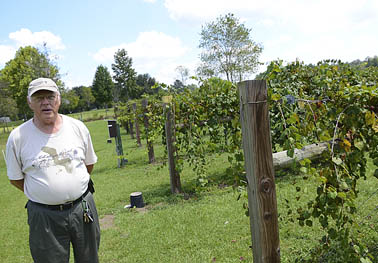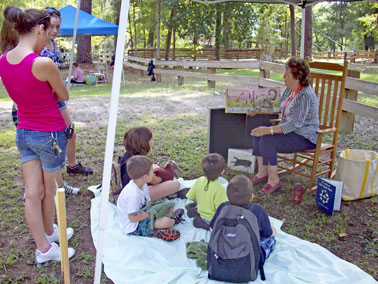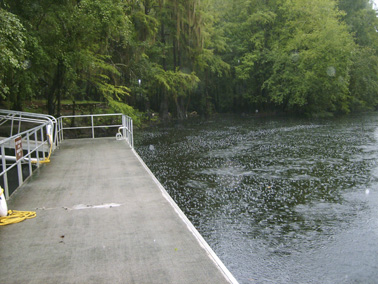Vineyard offers you-pick grapes while still in season
 LACROSSE – Lofting through the air, the aroma of fermenting grapes fills a vineyard just north of Gainesville near Lacrosse. The sweet fruit falls off the vines and gets mashed into the ground by the boots and shoes of visitors.
LACROSSE – Lofting through the air, the aroma of fermenting grapes fills a vineyard just north of Gainesville near Lacrosse. The sweet fruit falls off the vines and gets mashed into the ground by the boots and shoes of visitors.
The Loftus Family Farm has a vineyard that spans 14 rows, each about 420 feet in length. When the grapes come in season, the farm is open for anybody to come and pick them at the price of $1 per pound. From about the beginning of August to the end of September, people come from all over the county to harvest the fresh produce.
“These are coming along nicely,” said owner Don Loftus, as he walked through the vineyard to examine the grapes.
Humans aren’t the only ones who enjoy them. Sometimes, wasps find fermenting grapes with holes in them and go for the nectar. Intoxicated from the alcohol content of the juice, the wasps will fall down and flail around. “We have drunk wasps sometimes,” Loftus said.
It’s been a good season for the vineyard. Loftus had around 100 visitors last weekend. Some families go and pick a few pounds. Some come to get a bulk deal. There is one family of about five or six people that come nearly every weekend and pick over 100 pounds each visit, he said, to share with the extended family.
Loftus doesn’t use insecticides and sprays as few chemicals on the vineyard as possible. The visitors to the farm like knowing where their grapes come from and enjoy eating something without chemicals in it, he said.
Three kinds of grapes grow at the farm. Supreme grapes, a common variety, the Delicious, a self-pollinating muscadine developed by the University of Florida and the Ison grape, good for making wine.
Loftus and his wife planted the seeds for the vineyard in 2004, but the payoff would come three years later, in 2007, when the Loftus Family Farm opened for the public. Even then, the vines wouldn’t be in full production until 2008. The harvest has gotten a little better each year, and now seem to be leveling off, Loftus said.
They started the vineyard as a retirement plan. Don Loftus gets a pension from the University of Florida, where he worked as a TV producer out of the education department, but the farm provides extra income.
“It definitely keeps me busy,” Loftus said.
With the season being so short, the window of opportunity for picking fresh grapes is narrowing. Most visitors only pick off the fruit at the beginning of the vineyard, so finding grapes there is harder, Loftus said. He recommends going toward the back, to the places the other visitors ignore. Walking toward the end of the vineyard, he pointed out clusters of dark-purple grapes.
A family at the entrance to the farm weighed their haul for that day. It came to about seven pounds. Patricia Ashley, her husband and two granddaughters, spent a part of their afternoon at the Loftus Family Farm. It was her granddaughters’ first time.
“It’s enjoyable to pick something fresh,” Ashley said.
The vineyard is open from 9 a.m. to 6 p.m. on Saturday and 1 p.m. to 6 p.m. on Sunday. Appointments can be made for other days.
# # #
Email cmckinney@
alachuatoday.com
Add a comment

 HIGH SPRINGS –
HIGH SPRINGS – NEWBERRY – Newberry joined a list of proud cities Friday. That list boasts the likes of New York, Chicago, Atlanta and San Antonio. They did so with the Easton Newberry Sports Complex receiving a Community Olympic Development Program (CODP) status for archery Friday, Aug. 30. The city is one of only 10 in the nation to receive such a designation and only the second of its kind to showcase archery.
NEWBERRY – Newberry joined a list of proud cities Friday. That list boasts the likes of New York, Chicago, Atlanta and San Antonio. They did so with the Easton Newberry Sports Complex receiving a Community Olympic Development Program (CODP) status for archery Friday, Aug. 30. The city is one of only 10 in the nation to receive such a designation and only the second of its kind to showcase archery.  HIGH SPRINGS – Silver Sovereign, the snow-colored, blue-eyed newly born horse will be making his public debut at O’Leno State Park soon.
HIGH SPRINGS – Silver Sovereign, the snow-colored, blue-eyed newly born horse will be making his public debut at O’Leno State Park soon.  HIGH SPRINGS – Labor Day is coming up, but anybody with plans of visiting their favorite river or spring should check with state park authorities first.
HIGH SPRINGS – Labor Day is coming up, but anybody with plans of visiting their favorite river or spring should check with state park authorities first.